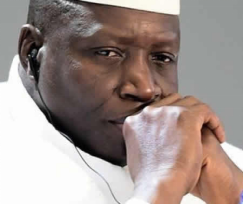By Kebba AF Touray
A new government report has revealed that more than 57 million dalasi was generated from the court-ordered sale of assets belonging to former President Yahya A.J.J. Jammeh, marking one of the most extensive state-led recoveries of ill-gotten wealth since the longtime ruler was ousted in 2017.
The report, issued by the Ministry of Justice, provides for the first time a detailed accounting of revenues derived from the disposal of Jammeh’s livestock, vehicles, and agricultural machinery, which were seized following a high court order in 2018. The disclosure comes amid growing public pressure on the government to provide transparency over the fate of Jammeh’s vast holdings, which had long been a source of controversy and speculation.
According to the document, a total of D8.3 million was raised from the sale of 725 heads of cattle — 625 from Jammeh’s expansive farm in Kanilai, his birthplace and political stronghold; 67 from his Farato farm; and 32 from Banjulunding. These sales were conducted under the supervision of the Attorney General’s Chambers and the State Intelligence Service, acting on the authority of the high court in the matter of The State vs. Alh. Yahya A.J.J. Jammeh (Sale of Livestock).
The auction process officially began on January 9, 2018, and concluded on January 31 of the same year. The proceeds, the report notes, were deposited into a court-ordered, interest-bearing account held at Trust Bank.
The most substantial portion of the revenue — D44.4 million — came from the sale of dozens of vehicles registered under the former president’s name, including luxury SUVs, trucks, and official state vehicles. Another D5.6 million was generated from the sale of Jammeh’s tractors, the report states.
The Sheriff’s report also outlines how 37 tractors were distributed across the country. Regional Area Councils received the lion’s share: the West Coast Region got 8 tractors, North Bank Region 4, Lower River Region 3, Central River Region 5, and Upper River Region 4. The Kanifing Municipality was allocated 11 tractors, while 3 went to the Banjul City Council. These distributions, according to officials familiar with the process, were intended to support agricultural development initiatives and compensate for years of neglected public investment.
The sale of Jammeh’s assets is part of broader efforts by the Barrow administration to recover public resources allegedly siphoned by the former President Jammeh during his 22-year rule. A 2019 report by the Janneh Commission — the inquiry into Jammeh’s financial dealings — found that the ex-president had misappropriated hundreds of millions of dalasi in state funds and accumulated an extensive portfolio of properties, livestock, and luxury items.
Public frustration has mounted in recent months over the slow pace of asset recovery and the lack of transparency in the process. Civil society groups and protestors have called on the government to publish a comprehensive inventory of all seized assets and explain how the proceeds are being used.
While this latest disclosure sheds light on a significant portion of Jammeh’s former holdings, questions remain over the status of other properties and businesses linked to him and his close associates, many of which are believed to have been transferred to proxies or remain unaccounted for.
Yahya Jammeh, who ruled The Gambia with an iron grip from 1994 to 2017, is currently in exile in Equatorial Guinea, where he fled after losing the December 2016 presidential election to Adama Barrow. Despite his departure, his political legacy and extensive economic footprint continue to cast a long shadow over the country’s transitional justice process.


















